The Sword & Planet Fiction of Robert Moore Williams: Zanthar
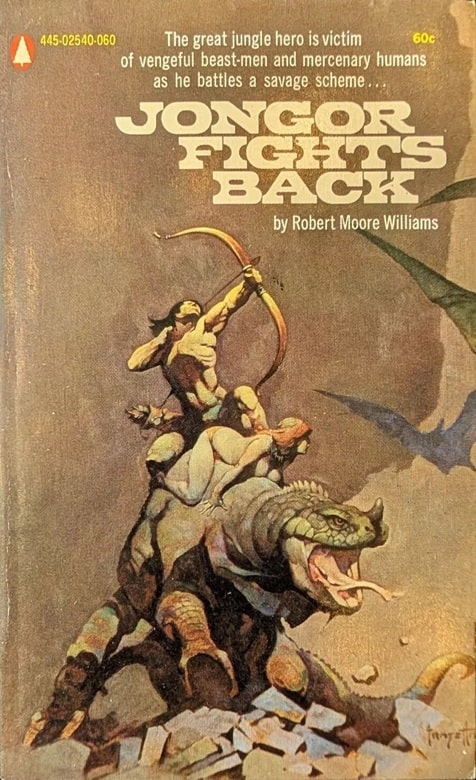 |
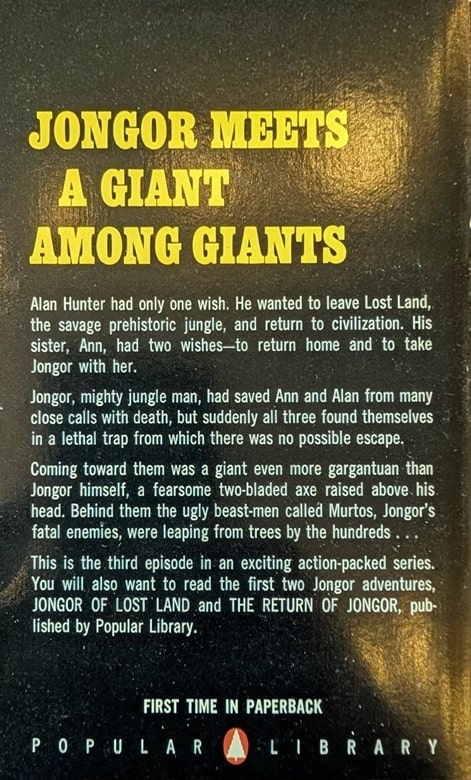 |
Jongor Fights Back (Popular Library, 1970). Cover by Frank Frazetta
Robert Moore Williams (1907 – 1977) wrote a lot of books, over 100. I’ve read two of them and that means there’s a 100 or so more books out there I won’t need to read before I die, including the ones he wrote under pseudonyms such as John Browning, H. H. Harmon, E. K. Jarvis, and Russell Storm. He also wrote an autobiography called Love is Forever – We Are for Tonight.
As a writer myself, I hesitate to be too critical of other writers. I know how difficult it is to finish a novel. But I don’t know how else to say it other than that — in my opinion — Moore was not a good one. The first book I found by him was Jongor Fights Back, a Tarzanesque effort featuring Jongor in a lost land. It was readable, but just barely. The cover, by Frank Frazetta, was a million times better.
[Click the images for Tarzan-sized versions.]
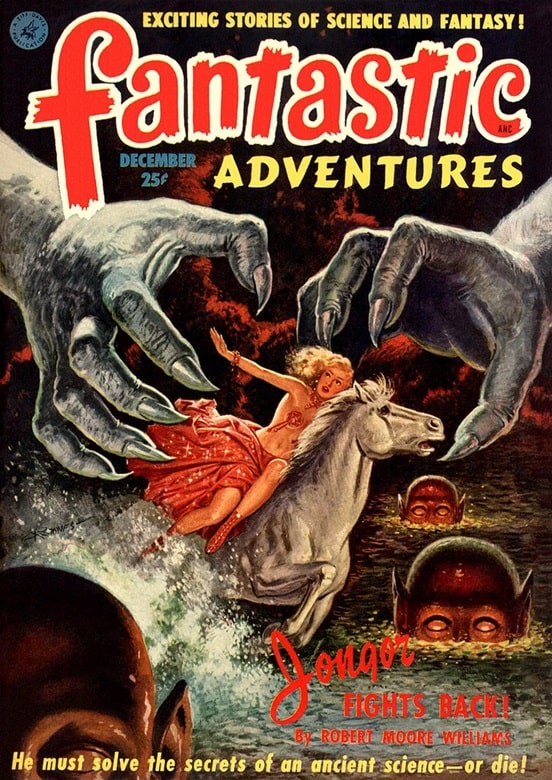
I found out this was the third book in the series, which included Jongor of the Lost World and The Return of Jongor. I decided not to spend any money getting them.
But then I saw Moore had written a Sword & Planet series. I had to have it and bought all four, shown below. All were from Lancer and as Lancers tend to do, they are falling apart.
The series in order is:
Zanthar of the Many Worlds 1967, Jeff Jones cover
Zanthar at Moon’s Madness, 1968, excellent Jeff Jones cover
Zanthar at the Edge of Never, 1968, Emshwiller cover
Zathar at Trip’s End, 1969, excellent Jeff Jones cover
I read the first one and put the other three away. Those of you who have been following this series know I love Sword & Planet fiction. It’s why I read a lot of it and why I write it. It can be the purest form of adventure fiction, and I take it seriously.
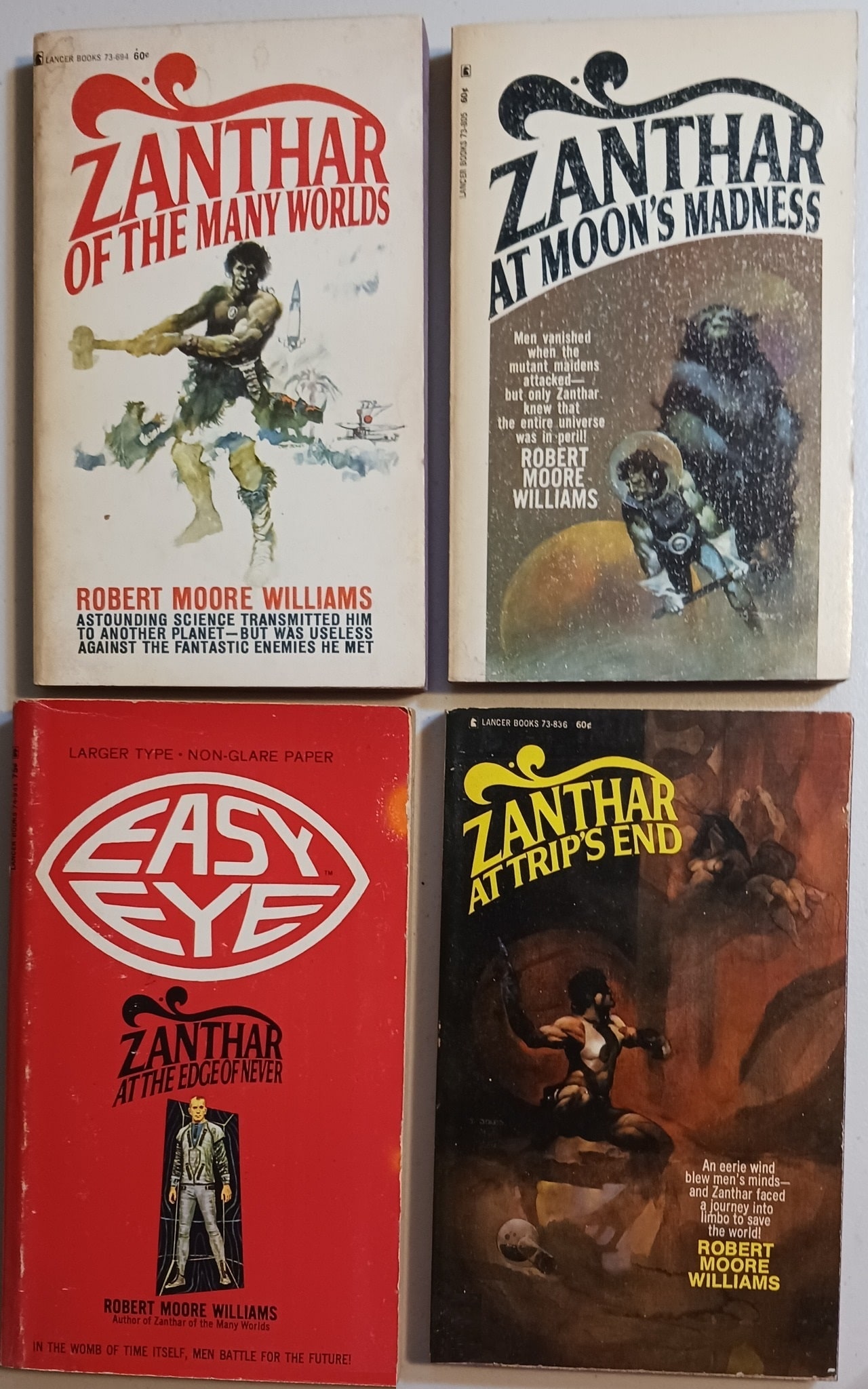
I also demand that the S&P writers I read take it seriously too. I’m afraid I can’t quite picture Robert Moore Williams taking the genre seriously.
I only read the first book, because it was just terrible. The book begins with John Zanthar, a brilliant Earth scientist who invents a machine that opens portals to other worlds.
Zanthar is sucked through it accidentally, and later two of his students are as well. So is a man named Fu Cong, who becomes the primary villain. So far, so OK.
Then the weaknesses arise. Most good S&P writers show that transportation to an alien world causes the hero some dislocation and discomfort. Not Zanthar. In the first few pages he acquires allies who decide he’s a god, and defeats the leader of a horde of attackers riding “miniature dinosaurs.” These appear to be T Rexes a bit bigger than the “Velociraptors” of Jurassic Park.
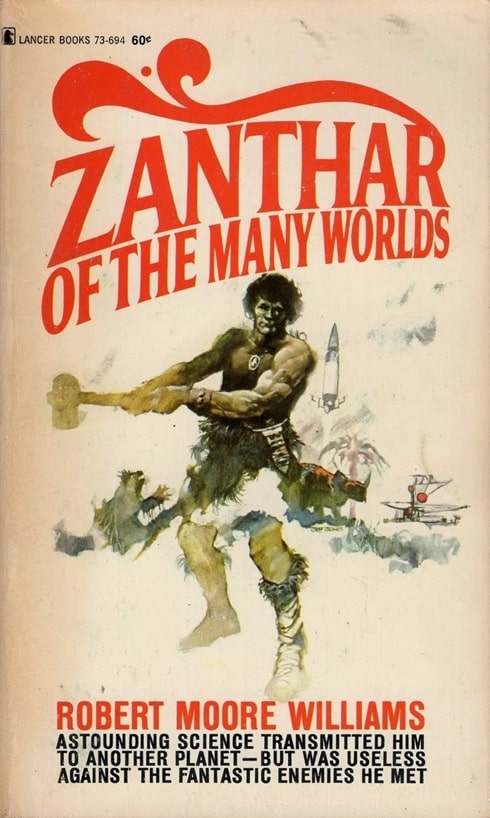 |
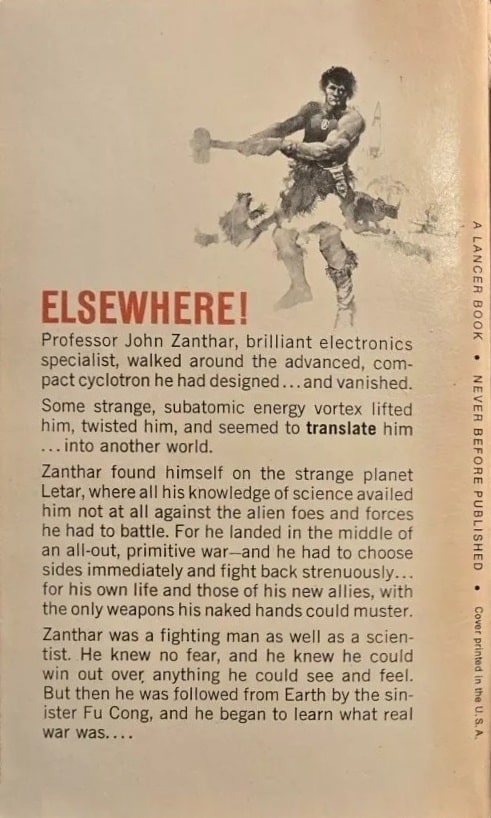 |
Zanthar of the Many Worlds (Lancer Books, 1967). Cover by Jeff Jones
Zanthar kills one dinosaur with a single blow from a “copper hammer” he’d been carrying in his lab when the transportation occurred. He also has no problem communicating with his new friends, who are conveniently riding telepathic beasts. And one of his new allies is a beautiful woman capable of healing any wound by laying hands on it and concentrating. Later she proves capable of raising the dead. (I’m not sure I’ve ever had a day that easy in the real world.)
I’m also a lover of good poetical prose, and the best S&P fiction has this. The prose in Zanthar of the Many Worlds is completely leaden, and in many cases just downright silly. Here’s a bit from early in the book:
And then: ‘The love-life?’ Zanthar questioned. He did not understand the term. In fact, he was not at all certain that he understood a tenth of the words she used. ‘I do not understand.’
The repetition was just wretched.
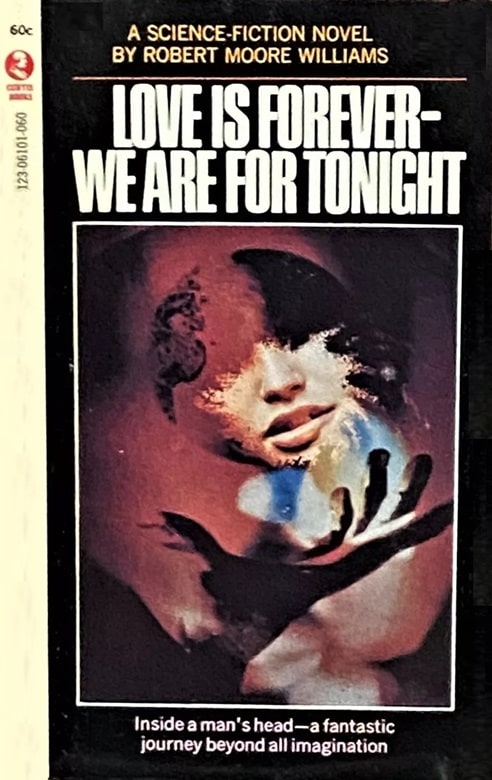 |
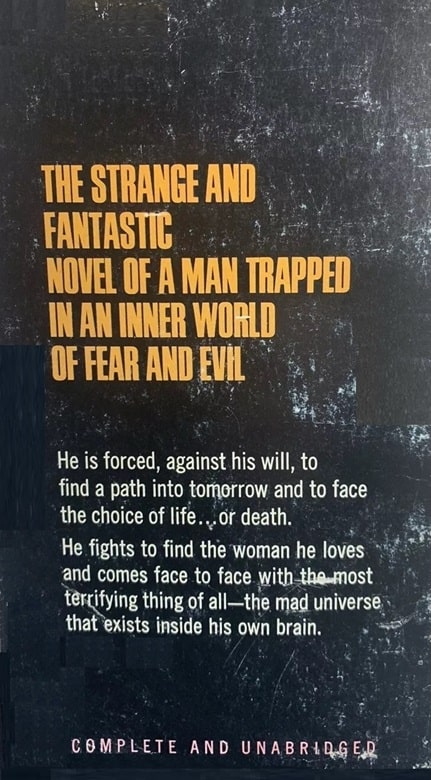 |
Love is Forever – We Are for Tonight (Curtis Books, 1970). Cover uncredited
Later, there’s an actual bit of dialogue imagined by Zanthar between atoms. I’m not making this up. Here it is:
Zanthar had the impression that he could hear the atoms talking each to the other, saying, ‘Brother, where are you?’
‘Comrade, what has happened?’
‘Sister, why are we in darkness?’
‘Cousin molecule, where has mother gone?’
‘And where is father?’
‘Is — is this the night that never ends?’ an atomic voice wailed.
‘Is — is this the end of the universe of atoms?’ another whispered.”
That was it for me. I scanned the rest of the book but can’t in good conscience recommend it to anyone.
I haven’t even tried the sequels. I can’t imagine they are better. I imagine these were published to take advantage of the paperback boom in the 1960s. The publication dates suggest they weren’t written exceedingly fast but Williams might have been writing a lot of other stuff at the time. They show very little evidence of careful construction. I read a quote once from Truman Capote about Jack Kerouac that I think applies to Robert Moore Williams: “That’s not writing, that’s typing.”
Charles Gramlich administers The Swords & Planet League group on Facebook, where this post first appeared. His last article for Black Gate was Chess in Sword & Planet Fiction, Part IV: Lin Carter’s Callisto.
I’ve read a couple of Williams’ science fiction novels. The Darkness Before Tomorrow was just awful; it gives the word “slapdash” a bad name. King of the Fourth Planet was much better, enough to reach the “pretty good” range. Certainly plot logic and graceful prose were not his forte. I got the impression that everything he wrote was produced with reckless speed.
That seems to be the case. Although he got some pretty good covers on his stuff and the titles are evocative, I doubt I’ll read anything else by him. He didn’t seem to care much about his work.
This author didn’t sound familiar until you mentioned the pseudonym “H. H. Harmon.” Looking through his bibliography, though, I don’t recognize what I read under that pseudonym. That’s an unfortunate further recommendation against him, because it probably means that I read the title once, stopped in the middle of the book, and tossed the whole thing into a storage box with a mental note to avoid the author.
I wonder if Robert M. Williams was one of those rare people who could type as fast as he thinks. A reader can always spot those on the serialization websites, because they generally have a very high volume of output, but it’s exhausting to read their stories through the haze of, “I’ve thought of four better ways to put that, already.” Self-editing is a rare skill that ought to be more highly prized.
That lack of self editing would certainly explain the stuff I’ve read by him. I suppose he was making money churning them out but it’s not a great legacy to leave behind from an artistic standpoint
It’s JongOr, not JongAr.
I bought Zanthar At Trip’s End years ago for the cover; never read it, now never will. I appreciate those who do the hard work of reading a book and recommending against others doing so, it saves me coming to the same conclusion myself the hard way. Jeffrey Catherine Jones was an amazing artist with a seemingly simple style which in reality demonstrates a great degree of thought and depth. There are a number of collected volumes of Jones’ work and a lot of it is also viewable online but sadly she produced very little in the comics genre – an area in which Jones excelled.
yeah, an O instead of an “A.” I”ve corrected it in the original. Thanks. Yes, Jones was awesome. I’ve never seen anything by her that wasn’t compelling
I read The Day They H-Bombed Los Angeles when it came out, and that gave my impressionable young mind many misconceptions about the survivability of nuclear war. Which led me to not share my parents’ (and every other sane person’s) fear when the Cuban Missile Crisis came along a year or so later. Apparently a number of our top generals shared my lack of fear, although it’s not clear if they shared my wishful projections of self and a goodly number of hot girls being the survivors. You never can tell.
Lot of stories been written about the post apocalyptic world after a nuclear war. I should do a post on that subgenre
Ah yes, what hath Edgar Rice Burroughs wrought?
Philip Jose Farmer was much better at this sort of stuff.
I’ve talked about Farmer a lot on my S&P page. He’s definitely much better than Williams. But I dare say most of the folks who have written fantasy were better than Williams.
The Sword and Planet genre needs to make a comeback. We need a new Frazetta or Boris Valejo cover artist too.
I agree. I hoped back in the early 2000s that my Talera series would spark a revival but alas it did not.
Hey! I found your book on Amazon! I’ll try it out. When you see that kindle sale, that was me. By the way, I think one of the best parts of reading Forstchen was the battle scenes. I think he captured the drama and terror of the battlefield very well.
Thanks, I appreciate that. Hope you enjoy. And yes, Forstchen really did battle scenes well. if you ever read Gettysburg you’ll see some great battle scenes there as well. And with similar elements to what appeared in the Lost Regiment